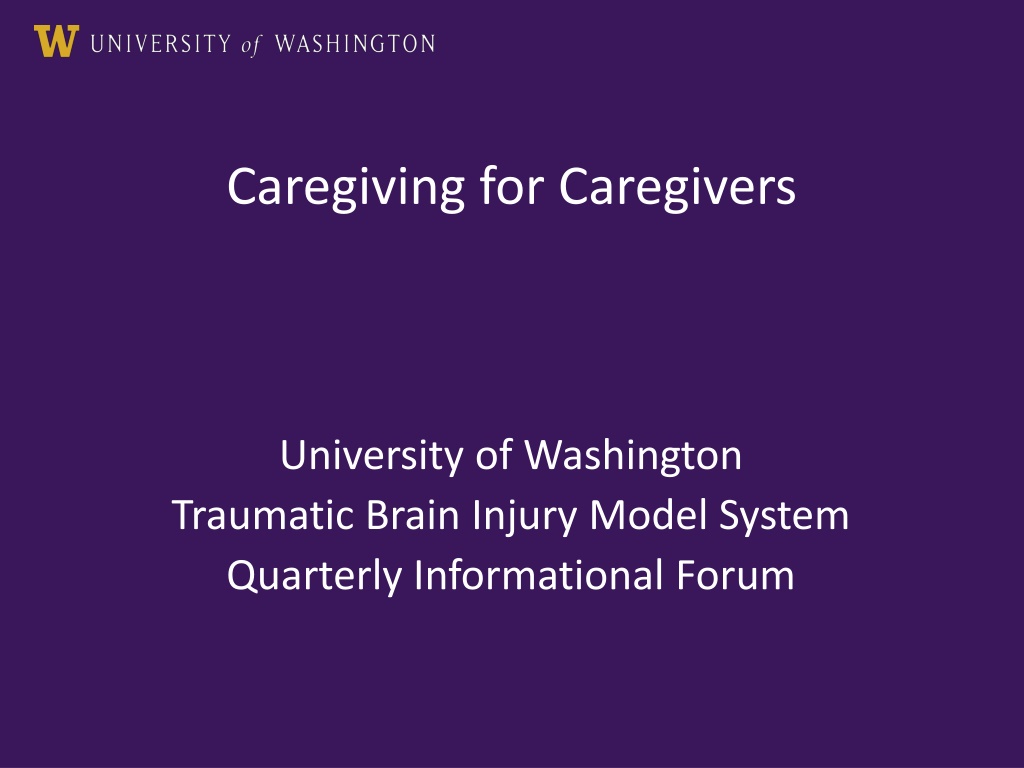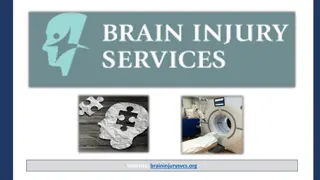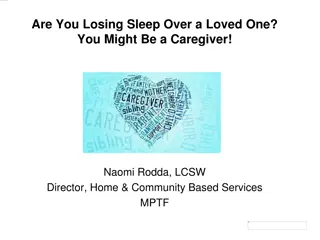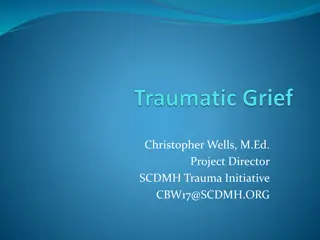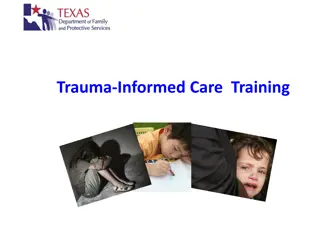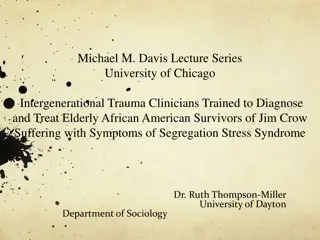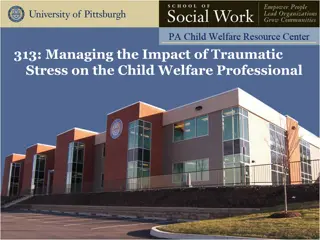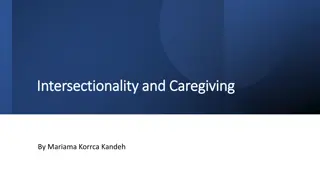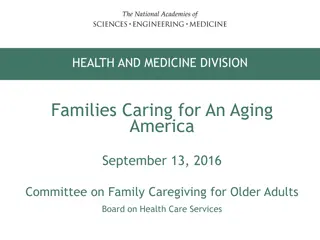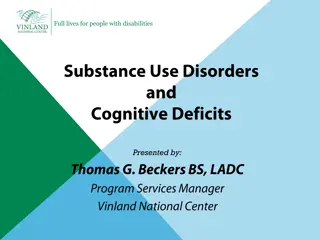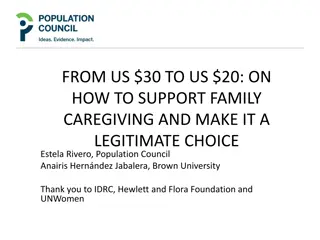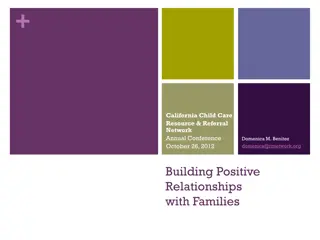Understanding Caregiving for Traumatic Brain Injury Survivors
Caregiving for individuals with Traumatic Brain Injury (TBI) is a crucial yet challenging role undertaken by family members or friends. The responsibilities can be overwhelming, impacting both the survivor and the caregiver's well-being. This presentation highlights the needs of caregivers, survivor changes post-TBI, service challenges over time, and caregiver consequences such as emotional distress and lack of support. It emphasizes the importance of addressing caregiver needs and providing adequate support in caring for TBI survivors.
Download Presentation

Please find below an Image/Link to download the presentation.
The content on the website is provided AS IS for your information and personal use only. It may not be sold, licensed, or shared on other websites without obtaining consent from the author. Download presentation by click this link. If you encounter any issues during the download, it is possible that the publisher has removed the file from their server.
E N D
Presentation Transcript
Caregiving for Caregivers University of Washington Traumatic Brain Injury Model System Quarterly Informational Forum
Presenters Janet M. Powell, PhD, OTR/L, FAOTA Associate Professor UW Department of Rehabilitation Medicine Hye Kyong Jeong, M.S.W. Director of Outreach & Advocacy The Arc of King County
Our Presentation Plan Needs of caregivers of persons with TBI Research study to meet caregiver needs Education Problem-solving Problem-solving steps example and practice Results of research study Top caregiver concerns Open discussion
What is a Caregiver? Family member or friend who assumes responsibility for well-being of person with TBI Informal, typically unpaid Does not need to provide physical assistance
Survivors of TBI Sudden, unexpected, life-changing event for person with TBI Results in changes in: Thinking (memory, attention, executive function) Emotions (irritability, anger management) Physical abilities (orthopedic, neurological) Often impacts ability to live independently Creates need for short or long-term caregiving
Services Over Time Medical, therapy, and other services tend to be front-loaded First few month after injury Focus on stabilization and recovery Transition from hospital to community increasingly difficult Shorter hospital stays Fewer community-based services
What About the Caregiver? TBI also a sudden, unexpected life-changing event for caregivers Steep learning curve in hospital with focus on Knowledge of TBI Needs of survivor Time when difficult to process/retain information Often do not remember what told
Consequences to Caregivers Less attention paid to caregiver s needs including Emotional adjustment How to live life while providing care Challenging circumstances over time with little assistance or support results in: 60-80% of caregivers with some degree of emotional distress 25-30% with substantial depression or anxiety
UW TBI Caregiver Study Focus on caregiver concerns After discharge to the community In the moment (as issues arise) Two-pronged approach Education Mentoring in problem-solving NOT provision of resources/solutions
Caregiver Participants 153 caregivers enrolled in study 82% female 79% White Non-Hispanic Average age 50 years 54% spouse/partner; 35% parent 65% living in same house at time of injury 125 (82%) assessed at 6 months
What Did We Do? Caregivers randomized to treatment or control group 8-10 phone calls to caregivers in treatment group Every two weeks after community discharge Identify and address primary concern through Study-specific educational materials Mentoring and practice in problem-solving
Education Materials 12 topics Generated from caregiver focus group Research team wrote chapter on each topic Information from Literature Clinical practice of interdisciplinary team Caregiver consultant Presented in notebook
Twelve Education Topics Being a caregiver Getting things done Caregiver emotional issues Social support Taking care of your health Accessing resources Managing activities for survivor at home Coping with emotional & behavioral changes Coping with changes in thinking & communication Medical issues Dealing with rehab system Work and school concerns Blue=caregiver, Red=survivor Purple=both
Mentored Problem-Solving 1. Acknowledge the situation 2. Define the problem 3. Set a goal 4. Generate multiple solutions 5. Evaluate the solutions 6. Plan your actions Try it out!
Problem-Solving Example 1. Acknowledge the situation 2. Define the problem 3. Set a goal 4. Generate multiple solutions 5. Evaluate the solutions 6. Plan your actions and try it out
Top Ten Caregiver Concerns 1. 2. 3. 4. 5. 6. 7. 8. 9. 10. Caregiver emotional adjustment (26%) Caregiver how to get things done (26%) Caregiver healthy habits (25%) Survivor emotional and behavioral concerns(25%) General participation in everyday life (22%) Survivor return to work or school (21) General financial concerns/insurance (21%) Survivor physical concerns (19%) Caregiver having time to self (17%) Survivor cognitive concerns (16%)
Treatment Group Caregivers Reported: Better emotional well-being Receiving more assistance from others More success in gaining information from health care providers Feeling better able to care for themselves Using more active coping and less emotional venting and humor
Getting the Word Out Multiple presentations to researchers and clinicians Two research journal articles Looking at ways to reach caregivers in the moment Electronic medical record note On-line video(s) Infocomics Written materials (pamphlets, book)
Open Discussion: Where Do We Go From Here?
Acknowledgments Kathleen Bell, MD, Co-investigator Robert Fraser, PhD, Co-investigator Jo Ann Brockway, PhD, Co-investigator Nancy Temkin, PhD, Co-investigator Kim Glorieux, Study Coordinator Heather Porter, MSW, Interventionist Melissa Mayes, Research Study Assistant Jason Barber, Database Manager
